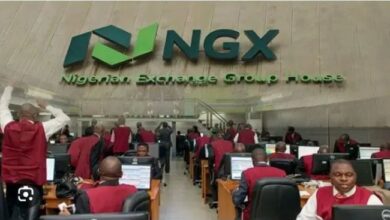Union Bank seeks to increase financial inclusion with Edu360 summit

The speakers at 2019 Edu 360 From L-R: Head, Strategic Brand Management, Union Bank, Ngozi Akinyele; Union Bank Plc CEO, Emeka Emuwa; Deputy Governor, Financial Systems Stability Directorate of Central Bank of Nigeria, Aisha Ahmad; Honourable Minister of State for Education, Hon. Chukwuemeka Nwajiuba and Partner of Edu 360, Dalberg, Carljin Nouwen… Photo credit: BrandPowerng
Union Bank Plc has called on educators and stakeholders across the country to seek believable solutions through purposeful engagements that will revamp the educational sector. This, the bank believes is due to its granite conviction that education should be an all-round learning experience that extends well beyond the classroom walls for rebounding positive impact.
The bank made the call at its annual education fair and exhibition “Edu 360’, which always provides an avenue for brainstorming on ideas that can improve the educational sector as well as learning and networking among the sector’s stakeholders which include students, teachers, school founders, parents, education enthusiasts and influencers among others.
The 2019 edition of Edu 360 is a three day event, themed “Education Beyond Walls”and was flagged off on Thursday, October 24, 2019 at the Union Bank Sports Complex, Surulere, Lagos.
The Chief Executive Officer of Union Bank, Emeka Emuwa, who gave the opening address, said the bank will not relent in focusing on developing the educational sector of the country as it is a key driver of national development.
The keynote address speaker at the event, Vice President Yemi Osinbajo, who was represented by Honourable Minister of State for Education, Hon. Chukwuemeka Nwajiuba noted that the theme for the event was relevant as it underscores the imperative for all governments around the world to lift the world into greater prosperity.
Nwajiuba said the government is out to combat all challenges the educational system is presently facing and yet to face. He said “Our vision as a government is to combat the current and future challenges in education. One of the mandates of this administration is to significantly reduce the number of out of-school children in Nigeria by finding empirical means of getting the actual figures and best ways to reduce the number to the barest minimum.”

Explaining some of the giant strides put in place by the ministry of education in tackling the challenges bedevilling the education sector, Nwajiuba said that the government has decided to elevate the country’s education standard to a competitive level in order to ensure a better future for the Nigerian children and make them very relevant wherever they may find themselves across the world.
“Over the past four years, the Buhari Administration has invested no less than 1.3 Trillion naira in the education sector by investments through the Universal Basic Education Commission (UBEC), TETFund and the Ministries and her agencies.
“Apart from primary education, a commission for secondary school education is being established to oversee operations of secondary schools. This is in a bid to ensure global standards for what our children are learning. Finally we ensured a downward review of Unity College Tuition fees from 83,000 to 49,500 naira and also pegged the PTA levy at 5,000 naira from the arbitrary charge of 75,000 naira. No doubt, the journey to revamping our education sector is a continuous one and demands conscientious and meticulous commitment- and we are ready to go on this journey, with the efforts and contributions of strategic partners like Union Bank.”
He further stated that even though funding is not solely the responsibility of the government, it is the fundamental pillar to rethinking and overhauling the education system in Nigeria even as he promised that the government will not stop funding the sector as it should.
“In all developed models of education across the world, funding is not the responsibility of the government alone. Rather, regulation and standard-setting is the purview of the government, prerogative as well as ensuring-not only an enabling, but fair- environment for all interested stakeholders to thrive. And to thrive in ways that benefit the entire citizenry.
“Our commitment as an administration to funding education will continue and particular attention will be given to other factors that ensure continuous enrollment and affordable access to education that empowers.”
The Honourable Minister further noted that technology will be a major driver needed to attain education beyond the walls of the classrooms, stressing that the government will continue to welcome technological innovations and harness initiatives for mainstreaming technology across the primary and secondary levels of education in Nigeria.
READ ALSO: See full text of Buhari’s speech at Russia-Africa summit
The first day’s panel session which discussed Financial Literacy for All, was moderated by Head, Strategic Brand Management, Union Bank, Ngozi Akinyele. The panel speakers included Deputy Governor, Financial Systems Stability Directorate of Central Bank of Nigeria, Aisha Ahmad; Honourable Minister of State for Education, Hon. Chukwuemeka Nwajiuba; Partner of Edu 360, Dalberg, Carljin Nouwen; and Union Bank Plc CEO, Emeka Emuwa.
The panel collectively agreed that financial education is a key component needed to drive financial inclusion and economic development, stressing that education itself is a veritable tool and that if properly harnessed, it will transform the Nigerian youths into valuable assets needed for the growth of the country.

Talking about the relationship between education and financial literacy, the moderator of the panel session, Ngozi Akinyele noted that though there is nobody who doesn’t know their way around money regardless of their level of education, there is more to financial literacy as it involves savings, investment and basically being included within the financial sector.
She said the panel was designed to bring together, across the public and private sector, a strong line-up of people who have made significant contributions towards driving financial literacy and public enlightenment on financial issues in Nigeria.
When asked to explain the strategic efforts that has been made with him being at the apex of the bankers’ committee in the financial literacy and public enlightenment sub-committee of the CBN, Emuwa said the bankers’ committee, as a body, sees financial literacy as a key part of a puzzle being financial inclusion.
He said: “To be financially included, you have to understand what being included is all about. So literacy and enlightenment is a key part of the puzzle. Through a combination of financial literacy programmes, public awareness campaigns, Union Bank has been able to inculcate, push and bring people closer to the financial system.”
“Every year, Union bank and other financial service providers in Nigeria together with the Central Bank participate in global money week where we teach primary and secondary school students about financial literacy. Also, we have ensured a great reduction in the financial non-inclusion level. These are part of what the bankers’ committee has done so far,” he said.
While explaining some of the interventions made by the government towards driving financial literacy for the Nigerian youths, Mrs Aisha Ahmad, said: “For us as financial regulators, we have tried to promote financial stability and economic development. But at the core of financial stability is inclusion. Without this, we would be less stable than we could be even if we have all of the cities participating in the financial systems.”
She noted that “there is a nexus between inclusion, financial education and economic development, just as enough research has shown that without literacy, one is limited in their financial inclusion goals.
“If you look at the world economy, you will see that it is those that have the highest inclusion rate that have the highest financial literacy rate. This explains why every regulator out there should go out and drive financial literacy initiatives. Meanwhile, what drives all the initiatives we have is the national literacy framework that was developed by the CBN in conjunction with several other regulators.” she said.
While noting that a literacy programme has to be targeted at the excluded segments of the society, she said the message has to be very relevant to the exact situation. Mrs. Ahmad said: “We are trying to put together literacy programmes targeted at the formal adults that are already included but needed to expand their access to second tier and third tier financial products. We also have those targeted at what we call the emerging adults; we have for youths, women and the physically challenged individuals. And all of the contents in these programmes are talking about not just financial planning, but also the various financial products, digital finance services and digital channels.”
“We are also looking at incorporating financial inclusion into the school curriculum because the problems we are having today with adult financial literacy is as a result of the curriculum not well fitted for such purpose. Financial education should be something that has been integrated into our education plan,” she further added.
In his brief contribution at the panel, Hon. Nwajiuba told the gathering that the ministry of education, having understood the critical roles the teachers play within the touchstones of national development, has put in place measures that will insure the life of every teacher in the country, adding that the ministry is open to all kinds of partnership and collaborations that will make both the Nigerian students and teachers very relevant in the tech-driven and financially inclusive global economy of the 21st century.
The Edu360 initiative is an annual event, founded in 2018 by Union Bank and remains one of the largest gatherings that bring together the key players in the education value chain in Nigeria.
Yetunde Adegoke








